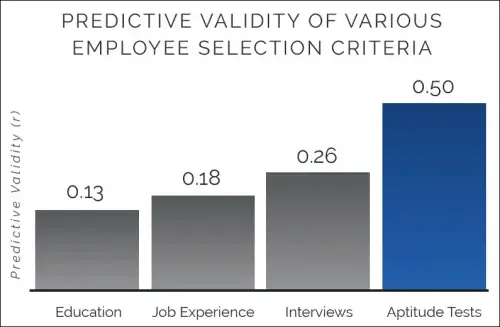Gamification is a hot topic right now, especially when it comes to HR and hiring. The idea of gamifying the hiring process has an undeniable charm, and the possibilities feel endless. We’re just now experiencing the very beginnings of what gamification could mean for hiring, and game-based assessments are really the first “gamified” offering to emerge.
It’s clear why game-based assessments are one of the earliest areas of innovation here. Traditional pre-employment tests can feel long and stressful, while games are thought of as fun and engaging. Pre-employment tests also have decades of research demonstrating their ability to predict job performance, significantly better than other hiring mainstays like resumes and unstructured interviews.
But the big question is: are these game-based assessments any good? Are they actually able to predict job performance in any sort of scientifically valid or accurate way?
The answer: it depends.
It depends on what the game is measuring (or trying to measure), how successfully it is measuring it, and whether or not the results of the game can predict job performance in a meaningful way. What this comes down to is the core of what gives an assessment “validity.” Not all assessments are created equal, especially when it comes to predictive validity.
Game-based assessments can theoretically measure any of the same types of things that you could measure through a traditional pre-employment test. The question is how well do they do it, and are you sacrificing the validity to make it into a fun game? Because ultimately it doesn’t matter how fun the game is. If it isn’t predicting job performance, or isn’t validated to do so, then there really is no point in using it in the hiring process.
Let’s start with cognitive aptitude. Cognitive aptitude is one of the best predictors of job performance of any hiring factor, and psychometric assessments have always been the best way to measure cognitive ability. Decades of research have found that cognitive aptitude tests are significantly more predictive of job performance compared to unstructured interviews, work experience, and education levels.

Unsurprisingly, when it comes to game-based assessments, we’re seeing that cognitive ability presents the greatest opportunities. When we think about what makes a good game-based assessment, we need it to have traditional game-like elements while also being scientifically valid and predictive of job outcomes. Because cognitive aptitude is already so predictive of job performance, it has a head start in this arena.
We’ve found that, in developing our own game-based assessments, cognitive ability very easily translates into a game-based environment, creating a fun experience while also providing critical predictive information for employers. Even more importantly, they've proved to be valid and accurate in measuring cognitive aptitude when compared to traditional measures.
Using games to measure personality traits can be a little trickier. While personality traits aren’t as predictive of job performance as cognitive aptitude, they are quite good at predicting success for particular types of roles in which a person’s work behaviors have a heavy impact on job performance. The science behind personality isn’t as definitive as the science behind cognitive aptitude, but the most widely accepted personality model is the Big Five model of personality, which measures the traits of Agreeableness, Conscientiousness, Extraversion, Openness, and Stress Tolerance.
While we haven’t yet seen a truly game-like assessment for personality appear on the market yet, we see a lot of potential for personality assessments to become gamified in the future.
And finally, there are assessments for acquired skills. Acquired skills are things that people can learn over time, as opposed to more innate abilities like personality and cognitive ability. Acquired skills are very important in the hiring process because they establish a candidate’s base-level knowledge. For example, do your candidates know how to use Excel and PowerPoint? Are they speedy at typing? These types of skills can potentially be tested in a game-like environment, but because skills can be learned, these assessments aren’t as predictive in the long-term as cognitive ability games or even personality games.
In sum, game-based assessments CAN be quite accurate and valid, especially if they can be shown to measure the same highly predictive factors that traditional pre-employment tests measure. If they can do this in a fun, engaging way, then game-based assessments provide a valuable, low-friction touchpoint for employers to evaluate candidates, particularly when they want to administer assessments earlier in the process.
But traditional assessments aren’t going away any time soon.
While game-based assessments are a promising area of talent assessment, they can’t yet offer a replacement of the traditional “test-like” experience. Game-based assessments offer the most value when candidate experience is of high importance and when employers want to administer the assessment at the start of the process. Traditional tests still have their place as a way to more rigorously identify candidate potential across multiple dimensions.
Want to learn more about game-based assessments? Watch our webinar on demand: How Game-Based Assessments Can Enhance the Candidate Experience





